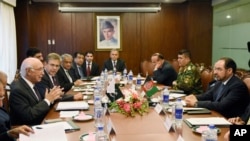Pakistani officials say they plan to ask Afghan officials Friday whether Kabul is interested in resuming peace talks with the Taliban.
The meeting, on the sidelines of an international economic cooperation conference in Kabul, comes nearly a month after peace talks broke down following news that Taliban leader Mullah Omar had died two years prior in Pakistan. The revelation led to questions over the Taliban’s leadership and suspicions about Pakistan’s role in supporting the group.
Authorities in Islamabad say Pakistani national security advisor Sartaj Aziz is scheduled to meet with President Ashraf Ghani and hold delegation-level talks with his Afghan national security advisor Hanif Atmaar.
The purpose of the meeting is “to determine whether Afghan leaders have made up their mind” about whether they will continue fighting the Taliban or resume peace talks with the Taliban, said a senior Pakistani official who requested anonymity in disclosing details of the sensitive talks.
Islamabad hosted a meeting between the Afghan government and Taliban representatives in early July, the first official contact between the sides in 14 years.
That groundbreaking face-to-face contact was the outcome of Afghan President Ashraf Ghani’s outreach to Pakistan by putting aside past differences to seek the neighboring country’s help in bringing about peace in Afghanistan.
But a second round of talks scheduled for July 31 had to be cancelled shortly after Afghan authorities and later the Taliban confirmed the insurgent group’s longtime leader, Mullah Omar, had died two years ago.
“Our message [at the meeting] will be very clear: We believe reconciliation [with the Taliban] is still the best way. Pursuing the military route will have destructive consequences for both Pakistan and Afghanistan,” said the senior Pakistani official closely associated with the efforts aimed at promoting Afghan peace and reconciliation.
Since the news of Mullah Omar’s death there has been a rise in deadly insurgent attacks, particularly in Kabul. The violence has led President Ghani to accuse Islamabad of not doing enough to stop the Taliban and groups like the Haqqani network from planning the violence from Pakistani soil.
In a harshly worded statement issued this week ahead of Aziz’s Kabul visit, President Ghani’s office said the main difference between Afghanistan and Pakistan is over the presence of terrorist groups, in particular the Haqqani Network, inside Pakistani territory.
“There is credible evidence that the leadership, command and control center, support infrastructure and sanctuaries of the Haqqani Network and other terrorist groups are inside the Pakistani territory,” the statement said, asking Islamabad to take “meaningful action” against these extremists.
When asked about the allegations, the senior Pakistani official flatly denied providing support.
“We reject these assertions because [Afghan officials] have not presented any evidence to substantiate their claims.”




